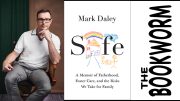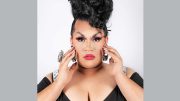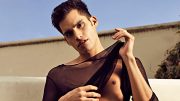By: Chris Azzopardi*/Special to TRT—
Tyson Ritter strips down to nothing for the All-American Rejects’ new queer project.
Fuzzy leopard-print top, blonde wig, fake eyelashes, low-cut skirt, stilettos – the frontman de-drags as he transforms from a prostitute, Betsy, to a seemingly married, suited-up man and life of the party, Robert.
The 11-minute short film conceptualizes identity and authenticity through the complicated and ultimately haunting duality of a single person. “Sweat,” a swaggering glam-rocker, finds Betsy leaving her mark on the streets – and in a bathroom stall when things get hot and heavy with an androgynous hookup. But then, during the juxtaposing come-down “Close Your Eyes,” we discover, tragically, Robert’s “real” life comes at a price.
As the alt-rockers mount a musical comeback with the two-song EP and a forthcoming album – their first since 2012’s Kids in the Street– Ritter, 33, opened up about his own femininity, being asexual for three years, his strong opinion on how “everybody’s selling celebrity” and being there for his lesbian sister when their family was not.
Q: Can you tell me about the concept of this short film and how you ended up using a crossdresser as your subject?
A: Jamie Thraves is a brilliant British film director who we were lucky enough – he’s actually FaceTiming me right now. Hang on. (Laughs) We’ve become brothers over this, but he approached us with a simple one-line concept that just said, “I see Tyson playing a woman and I see him playing a man named Robert whose fantasy is playing that woman.” It broadened beyond that through our correspondence because, of course, I had immediate questions for him about the story of Robert and the purpose of this film. Once we boiled it down, it was just this concept of identity and how people in all walks of life are never the same person in any room they walk into. I think Robert’s struggle to find himself was something that bled into my correspondence with Jamie, and we just started exploring all of our dark secrets together. It was really this cathartic thing to just talk about our lives and the regrets we’ve had and the compromising things we’ve done to become the person we were and are.
Q: How have you had to come to term with your own identity? Have you ever questioned your own sexuality?
A: I absolutely have. I went through a really bad breakup when I was in my mid ’20s and I was asexual for almost three years, just living in New York by myself, totally stone sober and trying to find myself. I was raised by my mom and my grandma, and that femininity and that balance within myself of the masculine and feminine has always been a yin-yang. It’s pushing and pulling, always. And I embrace that energy because I think some of the strongest things about me are from what my mother and my Nannu gave me.
Q: I feel like most alt-rockers are comfortable exploring the gender spectrum.
A: Iggy, man. I was covering my body in glitter in 2009 and everybody thought I was a lunatic. People forget about the spectacle of rock ’n’ roll being something that is fearless. To be a superhero in a band is something that takes all powers. And when you’re on the stage and giving yourself to thousands of people, you have to be this cartoon; it’s beautiful to embrace that in your own life.
Q: These tea dates, where you meet with fans and have tea, which I love, aren’t exactly the most masculine thing. Have you had any tea dates with anyone from the queer community?
A: My tea dates have just started, so it’s been such a mixed bag of all walks of life. It’s incredible. People have been like, “Oh, you should journal about your tea time,” and I’m like, “No, this is precious to me and private.” A lot of people sell their time to their fans. Everybody is selling access now and I think that’s the fucking complete corruption of what’s going on with the music business. Everybody’s for sale in a completely different, fucked up way.
Q: Are you referring to certain mega pop stars who give themselves to their fans in charitable ways for the purpose of advertising their brand?
A: I mean, I can’t even touch that, man. Everybody’s selling celebrity. And we’re a band that only sells music, and that was the most important part about this visual journey for this band. I grew up in front of the record button since I was 16 – how much have you fucking changed since you were 16? It’s funny, people put these expectations on bands to sound the same, to stay in that little time capsule with their friends from high school and their dreams in their twin-size bed and it’s like, no, art has to grow up; the artist can grow up with you, man. And so that’s where we came at with this new offering of “Sweat”/”Close Your Eyes.” We’re coming back with purpose and I’m proud of that because, ultimately, I’m not trying to sell ad time on my Insta account. Everybody has to have access to you now and so it’s really kind of – I might be shooting myself in the foot because I’m not being this, you know, social whore that most people have to be to play in this crazy rat race of the music business.
Q: As someone who’s been acting for several years now, you may be aware of opposition to cis, white men acting as LGBT or queer. There’s been a lot of pushback regarding this. How conscious were you of that sentiment while developing the storyline for this video?
A: I always knew that (Betsy) was a fantasy of Robert and it’s that suspension of disbelief that kept me grounded in the character. My wife helped me a lot. I just wanted to make sure that I grabbed onto all the femininity that I’m not afraid to show and put it into Betsy. I didn’t wanna approach the character half-assed at all, and as far as it being a risk to play that role, to me it was an escape and a surreal journey through a fantasy of Robert’s. At the heart of this story is a man named Robert who has a life and has a purpose, and I was serving him. So, I guess I didn’t feel like there was a compromise given that the character I was playing was the true heart of this journey.
Q: In what ways do you identify with Betsy when it comes to any overlapping femininity?
A: I think that’s precious to me. I think if there is overlap, just top to bottom, it was the curation of getting her walk down. I would wake up almost every day and put on my heels and walk around my house for hours on end to find my gesticulations and where Betsy carries herself. I think it was some of (my) stage persona. There’s a crazy confidence to Betsy that I loved being able to embrace and Robert didn’t have that. Robert’s this guy who hides from himself, and I think being able to embrace that was really a freeing thing. Honestly, it put me back in my own skin in a completely different way where even now on stage I’m finally feeling comfortable to embrace everything that I am.
Q: Growing up in Stillwater, Oklahoma, what was your introduction to the LGBT community?
A: My sister. I was 10 years old when my baby sister was born and my parents had a complex, tumultuous Oklahoma divorce, and I was there to sort of raise her in a lot of ways. When I had to get on the road when I was 16, leaving her was… even talking about it, it kind of echoes heartbreak for me. We kept our correspondence, and as she grew, I was on the road. When she was 15, she came out.
Getting the family’s acceptance in Oklahoma at 15 – I mean, probably one of the most difficult things I’ve had to help her survive. She helped me survive getting through just being an artist, too, because my parents haven’t always supported me. So we were holding each other’s hand as she got to 18, and now she’s engaged to be married. But I kind of saw a lot of (the LGBT community) through her eyes.
Q: There are few things harder than not being accepted for who you are, but it sounds like you had each other to lean on.
A: We did. At Christmases we were holding each other in the corner. We were the two weirdos, but at least we had each other.
Q: What does she think of “Sweat”/“Close Your Eyes”?
A: She loves it. She was so proud of me. I was really nervous. I was like, “I hope you love it and I hope you think I did good.” And she called me and she still has that Southern voice: “Aw, man, ‘Sweat’ is so good. You did so good, bubba.”
Q: There’s an album in the works. What can the gay community look forward to?
A: This music is gonna be out, man. This isn’t gonna be an All-American Rejects record. This is a record that is gonna feature a lot of evolution. People are either gonna be grabbing onto it or they’re gonna be letting go, and I welcome both.
Q: You’ve given the LGBT community many encouraging songs over the years, including “Move Along.” Can we expect more along those lines?
A: I realize that, in these divisive times, there is so much hate and division. The thing that breaks my heart right now in the world is just how divided we are. Even my parents didn’t go through this shit. I think it’s pouring out of me right now, so the things that I see and feel in the world are the things that I’m gonna be writing about. There are gonna be songs for people who just want to sing out as an escape, but this isn’t gonna be empathetic pandering – rock ’n’ roll is the escape, man, and I feel like we’ve lost that sentiment with celebrity. People are forgetting about the music.
When you come to a Rejects show, it’s non-denominational; it’s a congregation of people who are there to let go of the outside world. The greatest thing that we can do as a people is gather without any sort of ill-will, especially nowadays. So, the beautiful thing about this next Rejects record? It’s gonna be something that sets people free. That’s what it’s doing for me, man.
*As editor of Q Syndicate, the international LGBT wire service, Chris Azzopardi has interviewed a multitude of superstars, including Meryl Streep, Mariah Carey and Beyoncé. Reach him via his website at www.chris-azzopardi.com and on Twitter (@chrisazzopardi).







